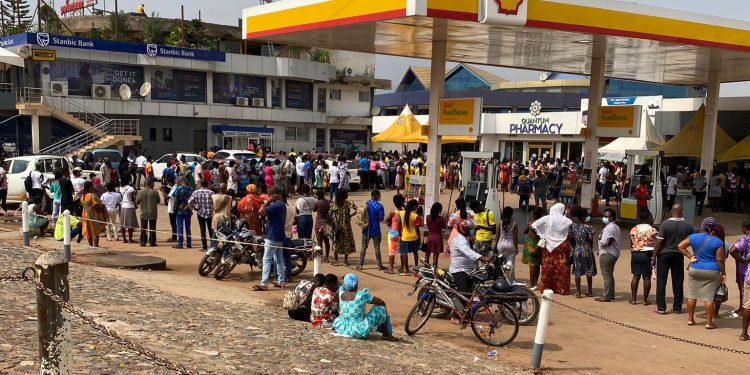
Accra, Ghana//-Robert Akologo, a 65-year-old retiree had to travel 767 kilometres (km) by road from the Upper East regional capital of Bolgatanga to Accra to re-register for his national digital ID, Ghana Card to enable him to re-register his SIM card during the nationwide exercise.
Mr Akologo liked millions of Ghanaians joined queues to get Ghana cards so that they could re-register their SIM cards in order not to be blocked by the government.
Millions of people who could not re-register their SIM cards because of their inability to access the Ghana cards were blocked, denying them access to telecom services and data, and mobile money services as well.
SIM Reregistration
In compliance with the directive received from the National Communications Authority (NCA), telcos in the country blocked several millions of customers who failed to re-register their SIM cards.
For instance, MTN Ghana blocked 5.4 million SIMs that were not registered with the Ghana Card as of the 31 May 2023 deadline, according to the company’s first half-year (H1) performance report.
Following that, customers with active SIMs that had not been registered with the Ghana cards were blocked from all transactions on MTN Ghana’s network from 1 June 2023.
“Furthermore, 0.4 million SIMs have been re-registered since the 31 May 2023 deadline bringing the total number of outstanding disconnected SIMs to 4.9 million at the end of the period. Consequently, our subscriber base decreased by 1.6% YoY to 27.3 million because of the disconnection exercise.
The full impact of the disconnection exercise on our subscriber base will reflect 90-days post the disconnection date with an expected decline in reported subscribers in H2 2023”.

The disconnection exercise exempted merchants, agents and persons who showed proof that they were facing challenges with Ghana card acquisition or SIM registration.
Subsequently, the Minister for Communications and Digitalization, Mrs Ursual Owusu-Ekuful announced in Parliament on 8 June 2023, that all merchant and agent SIMs not registered with the Ghana card had an extension till 30 June 2023 to register, to avoid being permanently blocked.
MTN Ghana whose digital financial subsidiary is MobileMoney Limited (MML) has engaged the regulator for further directions on the implementation of the Minister’s directive about merchants, agents and persons who showed proof that they are facing challenges with Ghana card acquisition or SIM registration.
The CEO of MTN Ghana, Selorm Adadevoh assured that MTN Ghana is committed to the national SIM re-registration exercise and would continue to deploy resources and work with the regulator to ensure SIM re-registration for all subscribers.
It is imperative to state that digital identification systems in Africa especially Ghana present a challenge for digital financial inclusion (DFI).
Digital ID
In Ghana, many services are reliant on the Ghana Card for digital verification or authentication. However, a large chunk of Ghanaians, especially those in the rural areas are excluded and unable to take part in digital financial services (DFSs).
The Ghanaian government introduced the Ghana Card for national identification and mandated all financial institutions in the country to accept the card as the only ID required for all financial transactions.
To further strengthen and enhance digital identification, the government again compulsorily directed that all telcos use the Ghana cards to reregister all SIM cards. However, forgotten that not all Ghanaians have registered for the Ghana cards. While many people living in rural, and underserved communities have no access to the cards to enable them to reregister their SIMs.
Linking SIM reregistration to the Ghana Card although a laudable one has resulted in the deactivation of thousands of people from accessing mobile and mobile financial services. So, these people are cut off from the digital payment services in the country.
Additionally, the National Identification Authority (NIA), and the NCA on countless occasions acknowledged that there are backlog of unprinted cards, uncollected cards, and sometimes duplicates and triplicates.
DFI and financial inclusion in danger
Furthermore, Ghanaians without formal ID-cards tend to be the poor, vulnerable and disabled members of the society and those living in rural areas, where mobile money is their only access to financial services, according to research.
In this case, digital financial inclusion (DFI) which is defined broadly as digital access to and use of formal financial services by excluded and underserved populations, could be hindered.
Similarly, financial inclusion according to the World Bank means that individuals and businesses have access to useful and affordable financial products and services that meet their needs – transactions, payments, savings, credit, and insurance – delivered responsibly and sustainably, is likely to be hampered.
It is not an easy task obtaining and replacing missing or old IDs in Ghana as the processes are hampered by bureaucracy. So, this means that the Ghana Card policy could dissuade the majority of customers from using mobile money.

Fake identification cards
Not all the valid national ID cards permissible in Ghana such as driver’s license, voter ID, passport, Social Security and National Insurance Trust ID, and National Health Insurance card are genuine, according to cybersecurity experts.
Because of this, it is difficult to trace digital payment fraudsters and other criminals in West Africa second largest after Nigeria.
How can these challenges be addressed?
The government must not do things that seem to be retarding or diminishing financial inclusion. However, it should focus on eliminating the barriers of digital payments by ensuring all Ghanaians irrespective of their locations are registered for and receive the Ghana card.
As experts in the digital payment ecosystem acknowledged, there can be no DFI without proper, adequate, effective, and efficient identification systems in the country.
This they argued would further facilitate interoperability by enabling many people to make all types of payments securely and transparently via single transactions.


